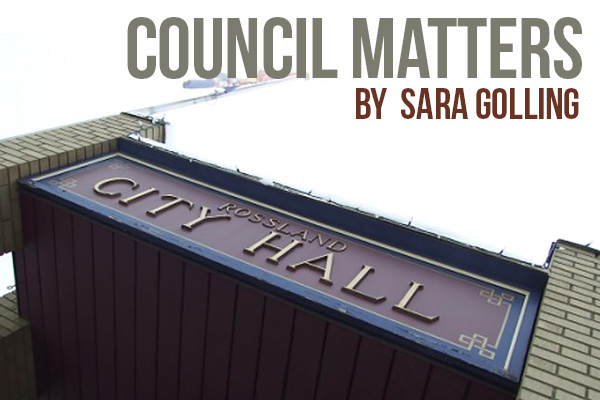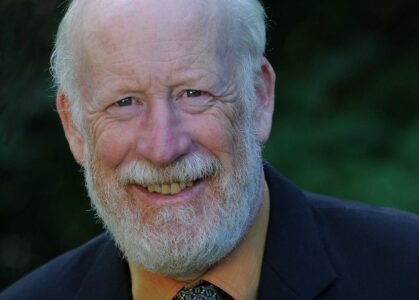Community Support vs. the Financial Crisis
Rossland City Council: Committee of the Whole meeting, January 21, 2015, 4:00 PM
Committee-of-the-Whole meetings, or COWs as they are called by council members who refer casually to “having a COW”, are relatively informal meetings of Council designed for information and discussion. Motions made in a COW are not final decisions, but are recommendations to Council for a scheduled regular meeting.
This report omits a great deal of discussion, but attempts to summarize the salient points from the four-hour meeting — as usual, in as unbiased a manner as possible for this human.
Present: Mayor Kathy Moore, and Councillors John Greene, Lloyd McLellan, Andrew Zwicker, AaronCosbey, and Andy Morel (Absent: Marten Kruysse)
Staff: Acting Chief Financial Officer Lois Hunter, Manager of Public Works Darrin Albo, Deputy Chief Administrative Officer Tracey Butler, Recreation Co-ordinator Robin Hethey
The meeting opened with a presentation by Dave Macleod and Jim Firstbrook of “ThoughtExchange” to discuss with the full Council an idea from Council’s Communication Committee: the possibility of doing “constituent engagement” work to explore public priorities for how Rossland’s tax dollars should be spent. In short: how much should be allocated to what in the City’s budget. Macleod pointed out that “everybody thinks that everyone agrees with them, until they see other people’s comments.” He said it isn’t helpful to present “a plan, and ask for feedback on it — because people won’t believe that decision-makers aren’t already married to the plan,” and think that the feedback is just a pointless exercise. It’s better, he said, to present two or more scenarios and get people to say what they like, and what they don’t like, about each one.
Firstbrook elaborated, saying that it’s important to use only scenarios that present potential actions that may actually be used — otherwise people can be left feeling that they were deceived; the scenarios must be realistic, and show outcomes that people can live with even if they aren’t their preferred solution.
Cosbey encouraged Macleod and Firstbrook to express the urgency of the financial crisis facing the City.
A motion to recommend to the next Regular Meeting that Council proceed with the ThoughtExchange program carried unanimously.
Council received a request from Mountain Market to use the Miners Hall to hold a fundraiser following the Winter Market on January 31st. Council considered the fact that the Market has already been granted the use of the Hall “at cost” for three Market days, and a motion to charge them the not-for-profit rate carried.
Acting Chief Financial Officer Lois Hunter then got down to business with a presentation to Council on Community Support and Recreation. She displayed information showing how much the City has spent on each facility, program and grant applicant over the past few years, both in cash and in “in-kind” services, and how much funding each applicant is requesting for 2015.
Requests for funding all add up to considerably more than the City spent on grants in previous years, both as a dollar figure and as a percentage of the City’s revenues. Facing the financial crunch, Council members discussed options for controlling spending, and decided that they should aim to spend no more than 7% of City tax revenues on grants to community organizations this year, and try to reduce spending in subsequent years to reach a total of 5%.
In addition to grants, the City also supports a number of community organizations and programs with property tax relief, the use of City premises at no cost or reduced cost, and in-kind services; and the City provides other community services itself, such as recreational programs.
Moore raised a question that she said has bothered her for some time: Why is the maintenance of City-owned buildings such as the Rossland Public Library and the Seniors’ Centre listed under “community support” in the budget, instead of under “public works” like the maintenance of other City assets? Other Council members agreed with her, and Hunter said she could easily make the change.
Council got down to discussing the merits of the grant applications, with an eye to reducing the total amount that will be disbursed to the 7% they had agreed upon. (Bear in mind that City revenues for 2015 can only be estimated at this point.) If Council simply disbursed the same total amount for community support as in 2014, it would amount to 7.34% of estimated tax revenues. If the City paid out all the funds applied for in 2015, the amount would approach 9% of the total anticipated City tax revenues. So Council members started looking very carefully at each applicant’s “bang for the buck” — in social or other forms of services, or economic benefit to the community, or in fulfilment of other Official Community Plan goals.
A few highlights:
The Rossland Chamber of Commerce applied for $41,699 for 2015. Last year, the Chamber received $32,451. Council members questioned the value to the community compared with the amount requested, especially in comparison with other organizations who receive less money and provide more apparent benefit. Greene gave a bit of history of the Chamber and mentioned that it is the oldest organization in Rossland. Zwicker indicated that he didn’t think mere age was sufficient benefit to the community. The Chamber itself had a goal of becoming less dependent upon the City for funding, and Moore referred to the Sustainability Commission (SC), which at one point received funding for a manager and then had its funding cut to zero, and wondered whether the Chamber would be able to “reinvent itself” as the SC did if its funding were cut that drastically.
Rossland Council for Arts and Culture asked for $4000. Council members agreed that the RCAC does an excellent job of leveraging their funding from the City.
Tourism Rossland asked for just one dollar more than they received in 2014. They were praised for being “very productive” and doing a good job of monitoring and reporting. Greene questioned whether they have actually increased “heads in beds”; Moore said that “heads in beds” have been increasing, and McLellan said Tourism Rossland has done “tremendous marketing.”
WildSafe BC does the “Bear Aware” program, but now includes challenges of other urban wildlife as well. Morel thinks they have done an excellent job of creating awareness in the community and referred briefly to his recent experience of having a bear destroy his bee-hive (he will now put an electric fence around it). Cosbey pointed out that bear numbers tend to increase after a good berry year, and we have had two good berry years in a row.
Financial Assistance for Recreation Programs: This is to provide assistance to qualifying people who use the Trail recreational facilities. Many members of Council initially wanted to cut this budget item to zero in hopes of reaching a satisfactory agreement with the City of Trail, but Cosbey pointed out that we have no assurance of reaching such an agreement, and if there is no budget amount for it, the recreational users would be left with nothing. The rest of Council was persuaded by Cosbey’s argument.
Visions for Small Schools Society (VSS) applied for funding; they applied in 2014 too, but had no funding from the City for that year. Cosbey cited the OCP, which lists K-12 education in Rossland as a priority, and noted that the Seven Summits Centre for Learning (operated by VSS) is the only reason that Rossland was able to keep the Ski Academy, which is a “big economic multiplier” for Rossland. He also noted that the VSS facility is too small for the number of students who want to attend it, and that VSS is struggling financially. Moore acknowledged that while education is not a municipal responsibility, the Learning Centre provides value to Rossland and she’d like to help it get established. Morel said he thinks K-12 is important to the community, and that VSS and Seven Summits Centre for Learning do not conflict with the public system, but are part of the public system (albeit not supported by School District #20). Zwicker described VSS as “go-getters” and wants to support them. Greene and McLellan agreed that VSS deserves support from the City, as they do provide “bang for the buck”.
Sustainability Commission: Council agreed that the SC has provided good value and has done a good job of leveraging the $5000 it received last year. Indications are that it will likely receive more this year — though not the $21,000 requested.
Rossland Historical and Archives Association (Museum): Last year, the City gave the Museum $48,450. this year, they have requested $53,000. Staying open in the winter is a new undertaking, and Cosbey noted that winter operation is expensive and doesn’t bring in much revenue. Morel wondered whether a “satellite location” closer to downtown would make more sense for the winter. Greene said that any exhibits downtown would have to be large, heavy items of little value.
As they discussed the grant applications during the meeting, Council members struggled to decide which applicants could best withstand bigger cuts in funding.
Bottom line: Few applicants will receive the amount they have requested. (And none will receive more than requested!)
Hunter presented information to Council on the cost of operating the City’s recreational facilities, beginning with the Arena and moving on to our parks, the Curling Club, swimming pool, and Miners Hall. Council discussed cost recovery and fees, and suggested that staff look into the rates charged by other communities in the region. Hunter noted that the Curling Club costs the City $11,000 a year; she said that the club has applied for funding. The application will come up at the next meeting, under “Public Works,” because it is for improvements to the City-owned facility.
During a discussion on public washrooms, Albo once again referred to the high community costs of vandalism — public washrooms are a prime target, which explains why we have so few.
Moore adjourned the meeting at 8:00, and weary people straggled out of City Hall into the night. Your reporter was exhausted enough to accept a ride home, where she immediately reclined with an escapist novel — to avoid thinking about money or vandalism — and dozed off with a soft warm cat on her lap.


























